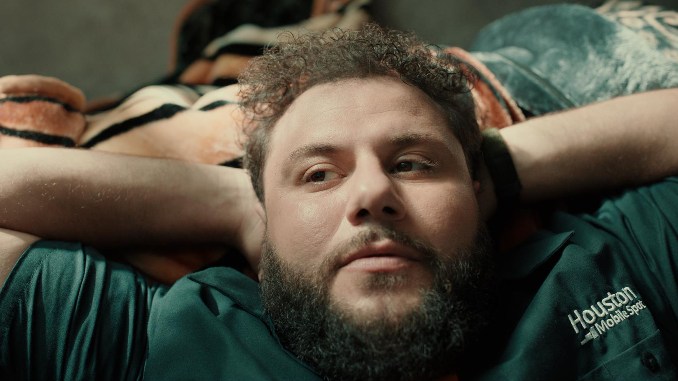Mo Amer Turns His Life Story into the Humane, Funny Series Mo
Image courtesy of Netflix
During the stay-at-home days of the pandemic, comedians were truly keeping us sane by dropping their comedy specials and original shows on streaming platforms to give us respites from reality. And it was also like a smorgasbord of discovery for lesser known comedians finally getting the kind of attention the comedy circuit can’t provide. One of my “finds” was comedian Mohammed “Mo” Amer via his two Netflix specials, Mo Amer: The Vagabond (2018) and especially Mo Amer: Mohammed in Texas (2021). A Palestinian immigrant who came to the U.S.—specifically Houston, Texas—at age nine with his mother and two siblings, Amer talks about the necessity of figuring out how to assimilate into the Latino and Black cultures of his new neighborhood, and then navigating the realities of being Arab and Muslim in a state like Texas, and the horrific limbo of being an asylum applicant for two decades before being allowed to naturalize. Both specials frame how whip-smart, resourceful, and respectful of Mo is of religion and cultures, while poking fun at the idiosyncrasies of how he was raised and the flaws of his adopted country.
Having first made an acting name for himself playing Mo the diner owner in Ramy Youssef’s critically acclaimed Hulu series, Ramy, the two have now collaborated to tell Amer’s story in narrative form with the Netflix series, Mo. Shot in single camera format throughout Houston, the show immerses us in the semi-autobiographical portrayal of Amer’s life before comedy made him a star. Amer shares basically the same real-life origin story of his series protagonist, Mo Najjar. A refugee from Palestine by way of Kuwait during the Gulf War, he escaped the Iraqi soldiers with his mother, sister, and brother, while his father stayed behind and was tortured by the regime and then passed away not long after he was able to reconnect with his family in Texas. Now 30, Najjar can’t pursue a proper career because he has no official papers as their asylum case has been bouncing around the courts for two decades, so he side-hustles with under-the-table gigs and by selling knock-offs from his car trunk. He still lives with his mother (Farah Bsieso) and brother, Sameer (Omar Elba), and has a prickly relationship with sister Nadia (Cherien Dabis), who has married a nice Caucasian in nearby Galveston. Najjar also is in love with his entrepreneur girlfriend, Maria (Teresa Ruiz), who has scrimped and toiled to open her own successful garage. But she’s a Catholic Latina, and technically that’s a no-no for his devout Muslim mother, so the relationship is idling in limbo.
Over the course of the eight-episode first season, we follow along as Najjar navigates his chaotic day-to-day life in Houston: checking in with an eclectic group of diverse and loyal friends, trying to protect and provide for his mother and brother, spending quality time with Maria, and all the while rolling with the continuous setbacks of life including their tenuous asylum status and his revolving door of jobs, like DJing at a strip club. But getting randomly shot at a grocery store in the pilot is what incites Najjar’s primary season-long trauma. Without health insurance, he refuses going to the hospital to get treatment for his graze wound. Instead, he gets stitched up by his tattoo artist friend. For the pain, he’s given liquid codeine—called lean on the streets—and falls into a dependence that he hides despite getting increasingly worse.
With its slice-of-life, vérité style that’s rooted in the sights and sounds of Mo’s actual Houston community, the series deftly stitches together the varied patchwork of what his American existence looks like. Despite being the youngest of the siblings, Najjar has taken to heart his father’s edict to take care of them, and Amer is able to portray the weight of how that responsibility has seeped into every pore of his character because he’s lived the same life. The codeine addiction in the show is clearly one of the first crutches Najjar has had in two decades of trying to be everything everyone needs him to be, despite being kneecapped by an immigration system that doesn’t allow him to live up to his full potential. Even with his positive outside countenance, Amer makes sure we feel the ripple of failure that simmers under Najjar’s skin. As they say, inside every comedian is a sad clown, and Amer taps into that with such authenticity by revealing his unique and personal story so poignantly over the course of the show.
-

-

-

-

-

-

-

-

-

-

-

-

-

-

-

-

-

-

-

-

-

-

-

-

-

-

-

-

-

-

-

-

-

-

-

-

-

-

-

-








































